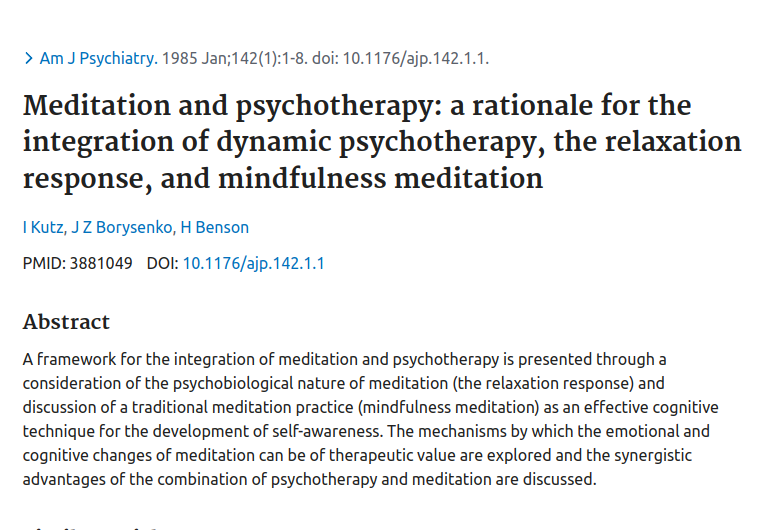Publication
The American Journal of Psychiatry
Abstract
A framework for the integration of meditation and psychotherapy is presented through a consideration of the psychobiological nature of meditation (the relaxation response) and discussion of a traditional meditation practice (mindfulness meditation) as an effective cognitive technique for the development of self-awareness. The mechanisms by which the emotional and cognitive changes of meditation can be of therapeutic value are explored and the synergistic advantages of the combination of psychotherapy and meditation are discussed.
Web and Email Links
Related Listings
Journal
The Journal of Nervous and Mental Disease
A cross-sectional national telephone survey was used to determine whether Christian Scientists (N = 230), a religious group that uses mind/body (including spiritual) healing, self-report more or less illness than non-Christian Scientists (N = 589). The primary outcome measure was the proportion of Christian Scientists and non-Christian Scientists that, during the previous 12 months: a) experienced any of 13 common medical conditions or symptoms; and b) used conventional medicine, unco […]
Journal
PLOS ONE
Background Poor psychological and physical resilience in response to stress drives a great deal of health care utilization. Mind-body interventions can reduce stress and build resiliency. The rationale for this study is therefore to estimate the effect of mind-body interventions on healthcare utilization. Objective Estimate the effect of mind body training, specifically, the Relaxation Response Resiliency Program (3RP) on healthcare utilization. Design Retrospective controlled […]
Journal
Developmental Medicine and Child Neurology
To assess the efficacy of electromyographic biofeedback, relaxation-response training and pain behavior management as a treatment for pediatric migraine, we studied 18 children between the ages of eight and 12 years (mean = 10 X 1) in a prospective, randomized, controlled investigation. Six patients received all three treatment procedures, six received relaxation-response training and pain behavior management, and the remaining six constituted a waiting-list control group. All patient […]

